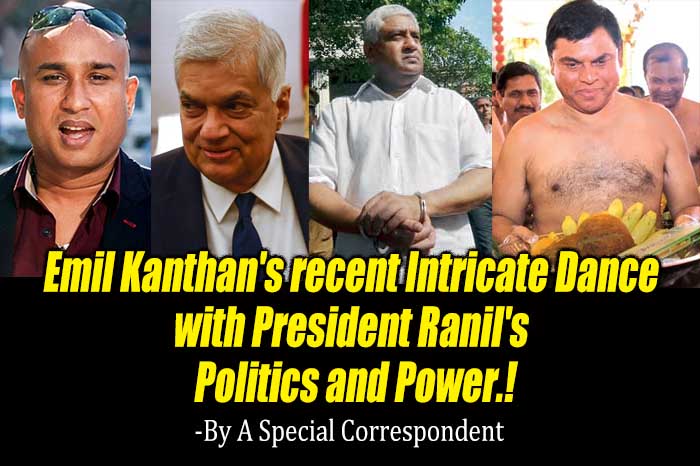-By A Special Correspondent

(Lanka-e-News -06.Jan.2024, 9.45 PM) In the labyrinth of Sri Lankan politics, where alliances are often formed in the shadows, the enigmatic figure of Emil Kanthan emerges as a key player in the tumultuous events leading up to the 2005 presidential election. Accused of brokering a clandestine deal with Basil Rajapaksha, a move that allegedly influenced the electoral victory of Mahinda Rajapaksha, Kanthan's web of connections has continued to evolve, with his recent return to the political stage alongside President Ranil since November 2023.
Prior to the 2005 presidential election, Sri Lanka found itself at a crossroads, torn between political rivals Mahinda Rajapaksha and Ranil Wickremesinghe. The intricate dance of power extended beyond the visible political stage, as rumors circulated about Basil Rajapaksha's alleged dealings with LTTE financier Emil Kanthan.
Reports suggest that Basil Rajapaksha, through then Sri Lankan Cabinet Minister Tiran Alles, engaged in questionable transactions with the Liberation Tigers of Tamil Eelam (LTTE). These transactions, believed to be bribes, were intended to coerce the LTTE into boycotting the election in the North East provinces, a move that would benefit Mahinda Rajapaksha, as Ranil Wickremesinghe enjoyed significant popularity among Tamil voters in the region.
The unexpected decision by the LTTE to enforce a boycott on the election, blocking Tamils in the north and east from voting, took both political pundits and Ranil Wickremesinghe by surprise. The move, as reported in a confidential cable by US Ambassador to Colombo Jeffrey Lunstead on November 22, 2005, likely cost Wickremesinghe the presidency, as he had not anticipated the LTTE's interference in Tamil voting.
In an ironic twist, Wickremesinghe speculated that had Mahinda Rajapakse won with Tamils in those regions permitted to vote, the LTTE could have portrayed him as unwilling to accommodate the Tamil minority. The LTTE's decision to prohibit Tamils from voting backfired, leading to international condemnation and undermining their potential claim of Sinhalese intransigence.
In the aftermath of the 2005 presidential election, Ranil Wickremesinghe expressed surprise and disappointment at the LTTE's actions. He revealed that the election commissioner had turned down his request for re-polling in the north and east, and international pressure, allegedly from French, Dutch, and Italian Ambassadors, discouraged the EU observer team from insisting on re-polling.
However, what Wickremesinghe and the US were unaware of at the time were the covert dealings behind closed doors. The post-election political analyses varied – some saw it as a rejection of Wickremesinghe's "peace process," while others believed it reflected opposition to his "neo-liberal economic policies."
Diplomatic cables, particularly a cable dated December 15, 2005, revealed the first mention of Emil Kanthan's potential involvement in LTTE connections. US Ambassador Lunstead met with Tiran Alles, the newly appointed Chairman of the Sri Lankan Reconstruction and Development Agency, who was rumored to be a close confidant of the President and a liaison with the LTTE.
Fast forward to February 12, 2007, and a "Secret" cable from Ambassador Robert O. Blake hinted at growing tensions. Reports of a threat against the President linked to Tiran Alles, who was allegedly involved in an assassination plot orchestrated by the LTTE, began circulating. The media frenzy intensified after the abduction of three Sinhalese members of the Railway Services Trade Union, accused of aiding the LTTE.
Mangala Samaraweera, then the Ex-Foreign Minister, confirmed LTTE contacts between Alles and Basil Rajapaksa. Rumors of a video tape implicating Basil Rajapaksa in an LTTE bribery scandal added fuel to the fire. The hostility escalated, leading to the dismissal of key figures and arrests.
On June 1, 2007, Tiran Alles was arrested on charges of violating the Prevention of Terrorism Act (PTA) by aiding the LTTE. Rumors of large sums of cash provided to the LTTE during the 2005 presidential campaign circulated, with allegations that Alles acted at the direction of Mahinda Rajapaksa's campaign manager, Mangala Samaraweera, and Basil Rajapaksa.
Alles' release on bail in June 2007 did little to quell the storm. Rumors persisted of a videotape in possession of Sripathi Sooriyarachchi, a former Deputy Minister, exposing Basil Rajapaksa's involvement in the LTTE bribery scandal. Sooriyarachchi's arrest for misuse of a government vehicle did not silence the whispers.
Basil Rajapaksa's concession to Ambassador Blake that pre-election contacts with the LTTE did take place added weight to the allegations. The government's use of the Financial Intelligence Unit (FIU) to harass and intimidate Alles, freezing his accounts, raised questions about the legal basis for such actions.
The story reached a critical juncture when Basil Rajapaksa admitted to the pre-election contacts with the LTTE. The mere suggestion of a deal with the Tigers stirred controversy, especially among the President's supporters, leading to internal political turbulence.
As Ambassador Blake predicted in his cable, the story disappeared from public attention. Tiran Alles, once at the center of a web involving Sinhalese support to the LTTE, was released without any charges. The allegations of LTTE bribery, election interference, and an assassination plot against the President seemed to fade into the background.
The tale of Emil Kanthan's involvement in Sri Lankan politics serves as a testament to the murky waters of power, where political opponents can face the wrath of anti-terrorism laws, and narratives can be manipulated or conveniently buried. In a country grappling with accusations of lawlessness, the echoes of this story linger, questioning the integrity of political processes and the resilience of justice.
---------------------------
by (2024-01-06 16:35:59)
Leave a Reply